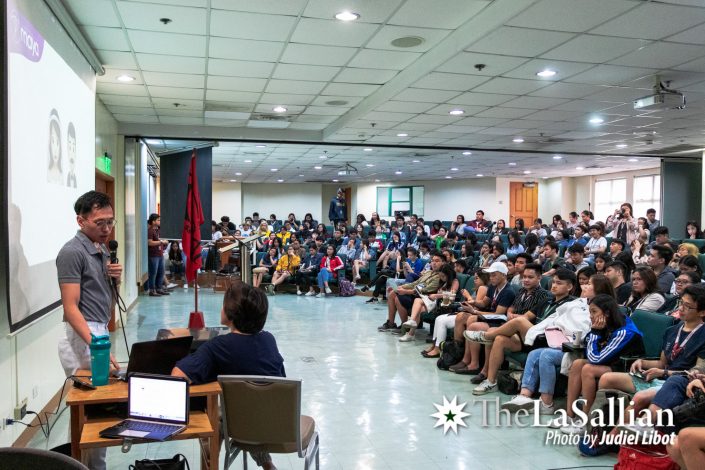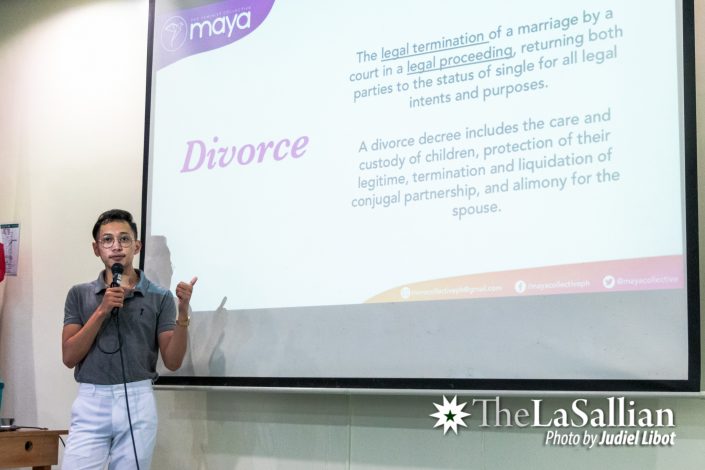USAP TAYO: Divorce Bill, a talk organized by Alyansang Tapat sa Lasallista (Tapat), in partnership with Maya: The Feminist Collective, was held last October 18 at rooms 508 and 509 at the fifth floor of the Yuchengco Hall. Guest speakers discussed the implications of instituting divorce in the Philippines and the underlying provisions of the Divorce Bill of 2018.
Divorce defined
Evez Evangelista, Vice Chair for External Affairs of Maya: The Feminist Collective, outlined existing provisions for separation that the country recognizes along with the Divorce Bill, a proposal aimed to institutionalize divorce as a way to break free from irremediable marriages.
Evangelista was optimistic about the bill, stating that attitude toward divorce among Filipinos has become more positive, with people viewing it as a viable escape from dysfunctional marriages. As Evangelista pointed out, “From 43 percent in 2005, [positive sentiment] increased to 60 percent in 2016. They (Filipinos) [agree] more kasi nababawasan na ang stigma regarding divorce.’’
(Filipinos agree more because the stigma regarding divorce has been lessened.)
Although Evangelista acknowledged that the divorce bill remains stalled in the Senate and Congress due to strong Catholic sentiments. He explained that many Filipinos still see the concept of divorce as “a direct attack [on] the religion.’’
On the other hand, Muslims are legally allowed to have divorce under Philippine law, as the Muslim Personal Code permits it under Sharia Law. Legal divorce is also permitted between a Filipino citizen and a naturalized foreign citizen under Article 26 of the Family Code.
Aims, claims, and pains
“For the safety, security, and well-being of the family. To leave the abuse and violence behind. To be free from the lack of financial and social support. To promote a nurturing family,” emphasized Tedi Peña, National Secretary General of Maya: The Feminist Collective.
She dug deeper into defining divorce, making it clear that the proposed law does not aim to simply provide an avenue for separation, but rather to promote and protect the well-being of the family.
Furthermore, the bill also recognizes the economic vulnerability of those looking to divorce, according to Peña. “Hindi kayang bayaran ang fees ng annulment,” she stressed, sharing that while annulment fees cost around P200,000, divorce proceedings would only cost around P60,000.
(Some can’t afford to pay the annulment fees.)
Peña called for the crowd to reach out to those being affected by separation. “If you have a friend who is going through something like this, then they probably need you to check up on them,” she said.
The forum on the divorce bill is only the first installment of Tapat’s USAP TAYO series for the year. Tapat Vice President for External Affairs, Paolo Driz, explained that the seminar was “conceptualized as more of an engagement for DLSU students,” characterizing it as a form of political pressure for Lasallians to be aware of pressing issues. “No one really talks about [the divorce bill] in terms of national affairs,” Driz commented.
He also added that Tapat aims to apply the same pressure to other legislation under the current government, stating that they contacted several LGBTQ+ organizations in hopes of educating Lasallians on topics such as the Sexual Orientation and Gender Identity and Expression Equality Bill, the Anti-Rape Law, and the Safe Spaces Act.
Currently, two divorce bills have been separately filed by Senators Pia Cayetano and Risa Hontiveros in the Senate. A counterpart bill in Congress, House Bill 7303, was approved for its third and final reading last year but foundered because of the lack of a counterpart bill in the Senate.



